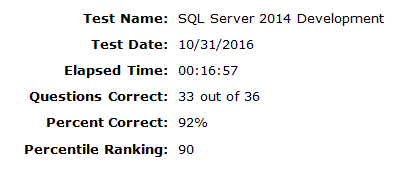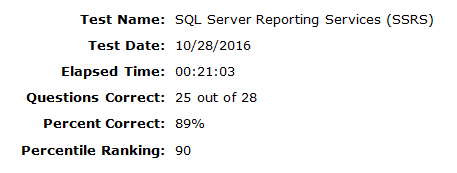By: Cate Murray | Comments | Related: More > Professional Development Interviewing
Problem
Many job seekers question whether sending a follow up note after an interview is still a good practice. Additionally, they struggle with the messaging and structure when drafting a thank you to each individual they met with as part of the interview process. When you consider that many candidates are ruled out from a “perceived lack of interest,” and then factor in that candidates should be looking for extra ways to positively differentiate themselves from other applicants, you can see why writing a quality thank you letter which shows appreciation, reiterates interest and key relevant qualifications, addresses skills gaps, etc. is a beneficial action to take during the process!
Solution
Sending a well-written and customized thank you letter to each person you met with during the interview process is always viewed in a positive light! Especially for positions you’re very interested in, taking the extra time to follow up with a note after an interview communicates your interest, commitment, initiative, and other positive traits. It’s also an opportunity to showcase your writing skills!
There are a few qualities/segments of strong post-interview thank you letters, which are now typically delivered via email! Here are our top 5 best practices to keep in mind when drafting your thank you letters soon after an interview:
- Show appreciation for the time of all those involved in the interview process.
Appreciation and gratitude are great traits you want to be associated with,
so express those at some point in your note! You can say thank you for their
time, but also, what they brought to the table. Did this individual break down
the key priorities of the role and all the technologies and tools they use?
Did they give you a brief tour? Did they share details on the end client/s?
Take your “thanks” a step further by sharing the “why” behind your appreciation!
- Reiterate your interest and/or excitement in the job. Managers want to hire
an individual who is going to be passionate about doing the best job they can,
and someone who is typically looking for a career or “work home.” In addition
to communicating your interest in the position during the interview, you can
reference aspects of the job specifically mentioned during the interview that
were exciting to you, which shows you were listening as well! For example, “I
was interested to learn you’ll be transitioning to SQL Server 2016 over the
next 6 months. I’ve already been taking training and using version 2016 in my
home environment.”
- Highlight your key qualifications based on your knowledge of the role. During
the interview, you hopefully shared how your skills/experience would translate
to you being a contributor to the role the Manager is hiring for. That’s why
we recommend engaging in the exercise/homework of reviewing the full job description
and list of requirements/pluses, and writing down why you’re qualified, the
night before an interview. In your thank you letter, you can re-address this.
As an example, if a position is looking for a Lead SQL Developer with 8+ years
of custom development, you could include a line in your thank you letter such
as “I’m eager to apply my 12 years of database development, 80-90% of which
has been creating custom solutions, and my 3 years of experience leading teams
of 3-6 other developers, if I’m selected for this opportunity!”
You can also communicate any skills, experience, or achievements you forgot to mention during the interview. After any big meeting or event, you’ll likely start reflecting on what you didn’t say. As soon as you get home, or even to your car, jot down key points you wish you had mentioned, and then weave those into your letter.
- Address any “candidate red flags.” A good question to ask yourself, and/or
the Recruiter you’re working with on the opportunity, both before an interview
and after, is “why might I not get selected for this role?” Then, determine
the best ways to mitigate that potential hiring concern! If you’re missing
a skill or version of a technology, and you haven’t already taken the time to
explain your ‘Training/Ramp Up Plan,’ do so now. For example, if you’re missing
SQL Server 2016 and that was listed as a preferred qualification, explain the
training resources you’d utilize and the time you’d invest prior to starting
the position so you’ll be in a better position to hit the ground running.
- Provide additional “candidate marketing materials.” At this point, you may have already sent code samples, the direct URL to your LinkedIn, Github or other online profile, recommendations, writing sample, strong technical assessment scores, etc. If you haven’t, you can take the opportunity to include these in your thank you letter. Ask yourself “what else can I provide the Manager with that will communicate my credibility for this particular role?” If you don’t have anything, we’d recommending asking a Recruiter to send you some technical assessments, get some LinkedIn recommendations, create a code sample, invest a few hours a week in training, etc. We suggest doing these extra measures as part of your overall “job search and candidate branding/differentiation strategy” anyways!
Here are a few additional best practices:
- Send within one day after the interview. Sending your thank you note a week later could be worse than not sending one at all. As part of your job searching/interviewing routine, do your best to draft and send your note the day of, or at least within 24 hours!
- Email vs. regular mail. We get a lot of questions on whether or not it’s ok to send an email and then also send a thank you letter via mail, since traditional mail is slower. The answer is absolutely! But keep in mind the timeframe. Best practice is to send the email within a few hours and drop the thank you letter in the mail within 24 hours.
Next Steps
- Take into account the above best practices when drafting your thank you note/email right after an interview. Then, like all pieces of important documentation, review it thoroughly, and ask someone else you trust to review it too!
- Here’s an example that incorporates our recommendations.
Example Thank You Letter
Insert Manager Name,
Thank you very much for taking the time to meet with me today and discuss the Senior Database Developer position on your team. I found our conversation to be very enjoyable and insightful, and I left with a better understanding of what the position will entail. I appreciated you talking through the primary expectations, environment size, projects in the pipeline, and expanding on details around the culture of the organization and what traits make Developers there successful. As I mentioned, I’m very excited about the opportunity to support a range of large-scale customers developing custom database and BI solutions, and I am excited to apply the experience I gained from working at XYZ Company doing just that.
While I don’t have experience with SSRS, I’ve worked with other reporting solutions, and have already started completing some SSRS training via Pluralsight and Coursera. I’d be happy to engage in additional training you recommend related to SSRS prior to starting as well, if you see fit!
I’ve included the results of two technical assessments I’ve completed over the last month via ProveIt and some of my LinkedIn recommendations below, and can provide additional references or other materials to help my candidacy if you’d like.
I look forward to hearing the next steps or the decision! Thank you again for your time and consideration!
ProveIt Assessments


LinkedIn Recommendations/References
Copy and paste any strong recommendations…
Sincerely,
Name
About the author
|
Erica Woods has nearly a decade in the IT staffing world, an MBA,
and is a member of the Professional Association of Resume Writers
and Career Coaches.
|
About the author
 Cate Murray is responsible for managing the nationally-based talent acquisition strategies of the Apex Systems PMO and Business Analysis Practice and holds her PMP certification from PMI.
Cate Murray is responsible for managing the nationally-based talent acquisition strategies of the Apex Systems PMO and Business Analysis Practice and holds her PMP certification from PMI.This author pledges the content of this article is based on professional experience and not AI generated.
View all my tips







